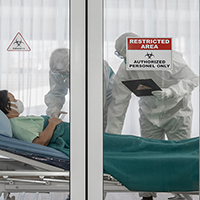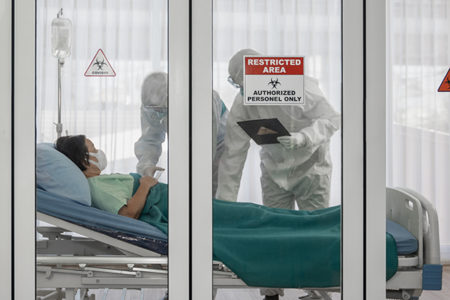PCDC: Protect 340B Reimbursement for Safety Net Hospitals


 Reducing reimbursement for safety net hospitals that are already distressed from the impact of COVID-19 would harm the underserved communities they serve, said PCDC in a public comment recently submitted to the Seema Verma, Administrator of the Centers for Medicare and Medicaid Services (CMS). The comment was in response to the most recent proposed Hospital Outpatient Prospective Payment Rule, which would further reduce payment to hospitals purchasing drugs through the federal 340B Program. PCDC submitted comments in opposition to a similar cut that was implemented in 2018. Savings from the 340B Drug Pricing Program provide a financial lifeline for the many safety net providers serving our nation’s most vulnerable patients. At a time when budgets are already stretched thin and Americans face a second wave of COVID-19, the proposed cut could destabilize safety net hospitals further.
Reducing reimbursement for safety net hospitals that are already distressed from the impact of COVID-19 would harm the underserved communities they serve, said PCDC in a public comment recently submitted to the Seema Verma, Administrator of the Centers for Medicare and Medicaid Services (CMS). The comment was in response to the most recent proposed Hospital Outpatient Prospective Payment Rule, which would further reduce payment to hospitals purchasing drugs through the federal 340B Program. PCDC submitted comments in opposition to a similar cut that was implemented in 2018. Savings from the 340B Drug Pricing Program provide a financial lifeline for the many safety net providers serving our nation’s most vulnerable patients. At a time when budgets are already stretched thin and Americans face a second wave of COVID-19, the proposed cut could destabilize safety net hospitals further.
Read the full letter below.
October 5, 2020
RE: CMS-1736-P: Medicare Program: Hospital Outpatient Prospective Payment and Ambulatory Surgical Center Payment Systems and Quality Reporting Programs
Dear Administrator Verma,
The Primary Care Development Corporation (PCDC) appreciates the opportunity to comment on the proposed changes to the 340B drug purchasing program in the CY 2021 Hospital Outpatient Prospective Payment System (OPPS) rule.
PCDC is a nationally recognized nonprofit organization and a U.S. Treasury-certified community development financial institution, catalyzing excellence in primary care through strategic community investment, capacity building, and policy initiatives to achieve health equity. Since our founding in 1993, PCDC has assisted over 1,000 primary care practices in more than 40 states and territories. We have improved primary care access for more than 1 million patients by leveraging more than $1.2 billion to finance over 130 primary care projects. Our strategic community investments have built the capacity to provide 4 million medical visits annually, created or preserved more than 15,000 jobs in low-income communities, and transformed 1.8 million square feet of space into fully functioning primary care practices. Through our capacity-building programs, PCDC has trained and coached more than 9,000 health workers to deliver superior patient-centered care. All told, PCDC’s work has impacted more than 40 million patients across the United States and territories.
The CY21 OPPS rule proposes that hospitals purchasing separately payable drugs through the 340B program would be paid at a significantly reduced average sales price (ASP) threshold rate and receive just 71.3 percent of ASP as compared with the current reimbursement of 77.5 percent of ASP – a further reduction from the pre-2018 reimbursement rate of 106 percent of ASP.
PCDC is deeply concerned that yet another cut to 340B will create additional stress on our safety net hospitals, which are already stretched thin to provide care for low-income communities with poor health status and have now been hit hard by COVID-19. Additional cuts to reimbursement for these providers will have harmful downstream effects on the hard-hit communities they serve – especially when budgets are already stretched, and Americans face a second wave of COVID-19.
The 340B program’s creation was a recognition that reimbursement alone is insufficient to create true sustainability for safety net providers to be able to provide coordinated, accessible care for the most vulnerable populations. The intent is explicit in the original report establishing the program, stating that it was created “to stretch scarce federal resources as far as possible, reaching more eligible patients, and providing more comprehensive services.” Continued cuts and attacks on the 340B program across all payers without ample reimbursement adjustments will erode the safety net and put patients at risk. This most recent proposed cut is one of many at state and federal levels that is reshaping the 340B program without replacing funding that is ultimately used to provide care for the most vulnerable. Compounding reductions and changes to the program will only destabilize these providers further.
As a financial institution with an extensive history of lending to safety net providers, we have an intimate understanding of how essential these providers are to the nation’s health and the importance of the 340B drug discount program in allowing them to provide critical services to the most vulnerable patients. Since Congress enacted the 340B program, many safety net providers have counted on 340B to help offset the high unreimbursed costs of delivering comprehensive care services to the medically underserved. And as we have seen in practice, the 340B program allows these providers to fund the care and ancillary services that ultimately keep a community healthy. This objective is successfully met through safety net hospitals’ fundamental mission of providing care to all, regardless of their ability to pay. Cuts to 340B reimbursement will significantly undercut these efforts.
Because 340B providers inherently see the most vulnerable populations, further cuts to this program are harmful for the physical, mental, and economic health of these communities. This leads to worsened health outcomes and could cause additional damage to local economies: hospitals and other health care facilities are core community institutions that provide comprehensive care and employment opportunities. With further uncertainty from reduced 340B Medicare reimbursement, many hospitals will have to make hard choices about the services they provide that will limit access for the communities that need them the most.
Safety net hospitals are essential in our nation’s health care system – a reality that has only been heightened throughout the COVID-19 pandemic. The primary and ancillary services they provide have an immense impact on the populations they serve. Individuals in many rural and low-income communities – particularly those on Medicaid and Medicare – with limited access to care often rely on these safety net hospital facilities as their sole source of care. These hospitals’ services help low-income families avoid serious complications from manageable diseases, which can ultimately jeopardize their long-term health and economic security. In this present moment, when receiving timely and affordable care can mean life or death, burdening hospitals with the task of finding new avenues for revenue puts the care of all patients at risk.
We urge CMS to consider the compounding consequences of enacting this proposed rule and withdraw these proposed cuts impacting 340B providers. Thank you for the opportunity to comment on the rule.
Primary Care Development Corporation (PCDC)
Patrick Kwan, Senior Director of Advocacy and Communications
(212) 437-3927 | pkwan@pcdc.org